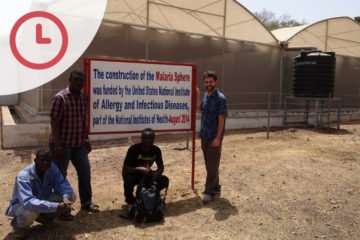Podcast Available on iTunes and Spotify.
Hello, I’m Thomas Locke and this is Five Minutes, the podcast that brings you closer to the people fighting malaria.
There are a number of stakeholders in the fight against malaria. Hundreds of organisations, nonprofits and government schemes are united by a common objective: to eradicate malaria. But how do you align this global community to ensure that everyone’s singing off of the same song sheet?
Well, the Strategic Communications Partner Committee, the SCPC, tries to do just that. Part of the RBM Partnership to End Malaria, the SCPC works alongside stakeholders to develop and implement global malaria communications.
Right now, between the 13th and the 14th of February, key members of the committee are meeting in Geneva, Switzerland for their annual face-to-face meeting. Joining me now is Xenya Scanlon, the Committee’s Manager.
Xenya, thanks for joining me.
Very welcome.
Could you give me an overview of what is happening in Geneva over the next two days?
Today and tomorrow, the SCPC Annual Meeting is taking place. It’s a committee that brings together key players in the global malaria fight, so it deals specifically with communications and, to an extent, advocacy issues. On the agenda of our meeting is the big question of how we are going to align the global malaria community, in terms of the current situation where on the one hand we see a lot of countries nearing elimination and on the other hand, we see that malaria has resurged, particularly in some of the high burden areas. We’re going to hope and align the community around some key messaging, we’re going to talk about key events for the year ahead, like the World Malaria Day on the 25th of April or, for instance, the forthcoming replenishment of The Global Fund to be hosted by France in October of this year.
There aren’t a lot of players in this. I read on your site that there are over 500 partners. What is the benefit of having them all in one room discussing the same issue?
Well, we won’t have 500 partners all of them represented at this meeting, although the partnership does have this broad reach and representation. What we tried to do is convene partners who were able to make it in person to Geneva and also those who might be wishing to join via teleconference. The idea is that we try to take the temperature of the community as to what they see as their priorities, how we can amplify each other’s efforts and where we can make valuable connections between organisations that would have otherwise been working more on their own.
The RBM Partnership was established back in 1998. Many years later, the situation with malaria has changed. What are the current priorities for you as part of the committee?
I think our number one priority is keeping malaria high on the international and developmental agenda. We’ve seen that, in some ways, malaria has seen a big change, as you mentioned, that we have had tremendous success historically in terms of the lives saved – nearly 7 million – in terms of the cases of malaria presented, thanks to this global partnership effort. But, at the same time, what we see is that, in some ways, malaria has become a victim of its own success and that we need to really remind people that, even today, a child dies every two minutes from the disease which is entirely treatable and preventable.
So, do you believe in, our current malaria climate, that we can achieve the current elimination goals?
I think this is the big question that goes beyond communications. I think there is a number of the scientific committees that are looking exactly at the feasibility of the achievement of some of the targets that have been set by the international community for 2030. There are scientific committees and panels that are looking into the issue of eradication and possible timelines of such historical achievements. For us, we need to keep the pressure on the governments and to not forget about this target and achieve, if not all, but at least some of them.
Xenya Scanlon, thanks very much.
Thank you very much.
That was Xenya Scanlon, the manager of the Strategic Communications Partner Committee. You can listen to more episodes of this podcast on iTunes and Spotify.


